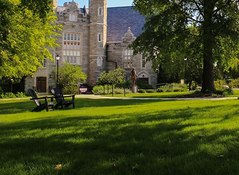West Chester 2017: Digital Humanities
PALA 2017 Summer School: July, 17 to Wednesday, 19 2017
The summer course introduced participants to various facets of the digital and computational turn that is currently taking place in the humanities. The school was run by members of West Chester University’s Digital Humanities (DH) program, and comprised the following workshops:
- Language Mapping for Spatial Analysis (led by Dr. Megan Heckert from the Geography Department)
The workshop described how to collect and structure linguistic data, process and aggregate data for spatial analysis, and present results visually using maps. During the workshop, participants were able to experiment with these methods by exploring datasets provided by the organizers. The workshop also showed how to install and use open source software, including a step-by-step demonstration of how to synthesize meaningful map data from the dataset, how to perform statistical queries, and how to create composite maps. - Introduction to Natural Language Processing and Sentiment Analysis of Texts (led by Dr. Randall Cream from the English Department)
This hands-on full-day introductory-level workshop helped participants to use open source software tools to study unstructured texts. The workshop taught participants to use freely available software to analyze texts large and small. The first half of the session provided a broad introduction to NLP and step-by-step methods for installing and using NLP software. In addition to a practical overview, participants used a dataset to explore key NLP techniques including tokenization, lemmatization, part of speech tagging, co-reference detection, and Named Entity Recognition. The afternoon session focused on more advanced methodologies in NLP, including sentiment analysis, topic modeling, and other stylometric applications. During the workshop, participants experimented with these methods either by exploring datasets provided by the organizers or through their own corpora.

